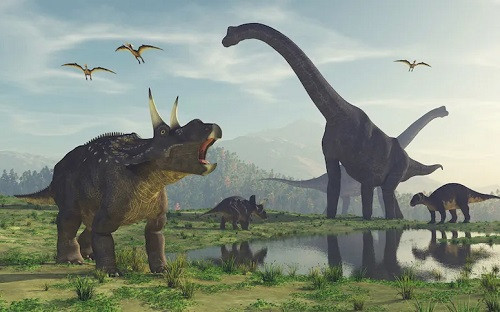Dinosaurs Could Have Coexisted with Humans if Not for the Asteroid, Study Reveals: Here's What Was Already Causing Their Decline

IIE Digital Desk : Suggesting that they may have survived and even coexisted with humans — had a catastrophic asteroid not struck Earth 66 million years ago. The research also reveals that dinosaurs were already in decline before the asteroid hit, due to environmental changes and shifts in global ecosystems.
Published in the journal Nature Communications, the study analyzed fossil records and ecological models to better understand the gradual changes in dinosaur populations leading up to the Cretaceous–Paleogene (K-Pg) extinction event. The researchers found evidence that certain groups of dinosaurs — particularly large herbivores like hadrosaurs and ceratopsians — were decreasing in diversity millions of years before the impact.
This pre-impact decline was attributed to a combination of factors, including climate cooling, volcanic activity, and a disruption of the food chain. One key driver was the gradual drop in global temperatures, which made it harder for some dinosaur species to adapt. As ecosystems changed and competition for resources increased, the dominance of certain dinosaur clades began to falter.
Lead researcher Dr. Fabien Condamine from the University of Montpellier explained, “Our findings show that dinosaur biodiversity was already vulnerable before the asteroid. The mass extinction was catastrophic, but it wasn’t entirely sudden or without context. Dinosaurs were not as ecologically invincible as once believed.”
The researchers used advanced statistical models to track extinction and speciation rates across various dinosaur families. They discovered that while some groups, like the theropods (which include the ancestors of modern birds), were still thriving, others had reached evolutionary plateaus or were declining due to changing environmental conditions.
The asteroid — a 10-kilometer-wide space rock that struck what is now the Yucatán Peninsula — dealt the final, devastating blow. It triggered massive fires, blocked sunlight for months, caused a plunge in global temperatures, and ultimately disrupted the entire food web. Nearly 75% of all species on Earth were wiped out in the aftermath.
Had this asteroid missed Earth, the study suggests that dinosaurs might have adapted to the environmental challenges and continued evolving. In this alternate timeline, intelligent mammals — including humans — may have eventually arisen alongside dinosaurs, potentially sharing the planet.
“Our models show a potential for dinosaur recovery if the asteroid impact had not occurred,” said co-author Dr. Guillaume Guinot. “It’s entirely plausible that mammals and dinosaurs could have shared ecosystems, leading to a very different evolutionary history.”
Interestingly, birds — which are now recognized as living descendants of theropod dinosaurs — are a testament to the adaptability of at least one dinosaur lineage. Their survival and success after the extinction event highlight how certain traits, such as smaller size, beaks, and faster reproduction, may have helped them endure the catastrophe that wiped out their larger relatives.
This study not only deepens our understanding of the K-Pg extinction event but also opens new questions about how life on Earth evolves under pressure. It emphasizes the complex interplay between gradual environmental change and sudden disasters — a dynamic still relevant today as we face ecological challenges of our own.
You might also like!

























